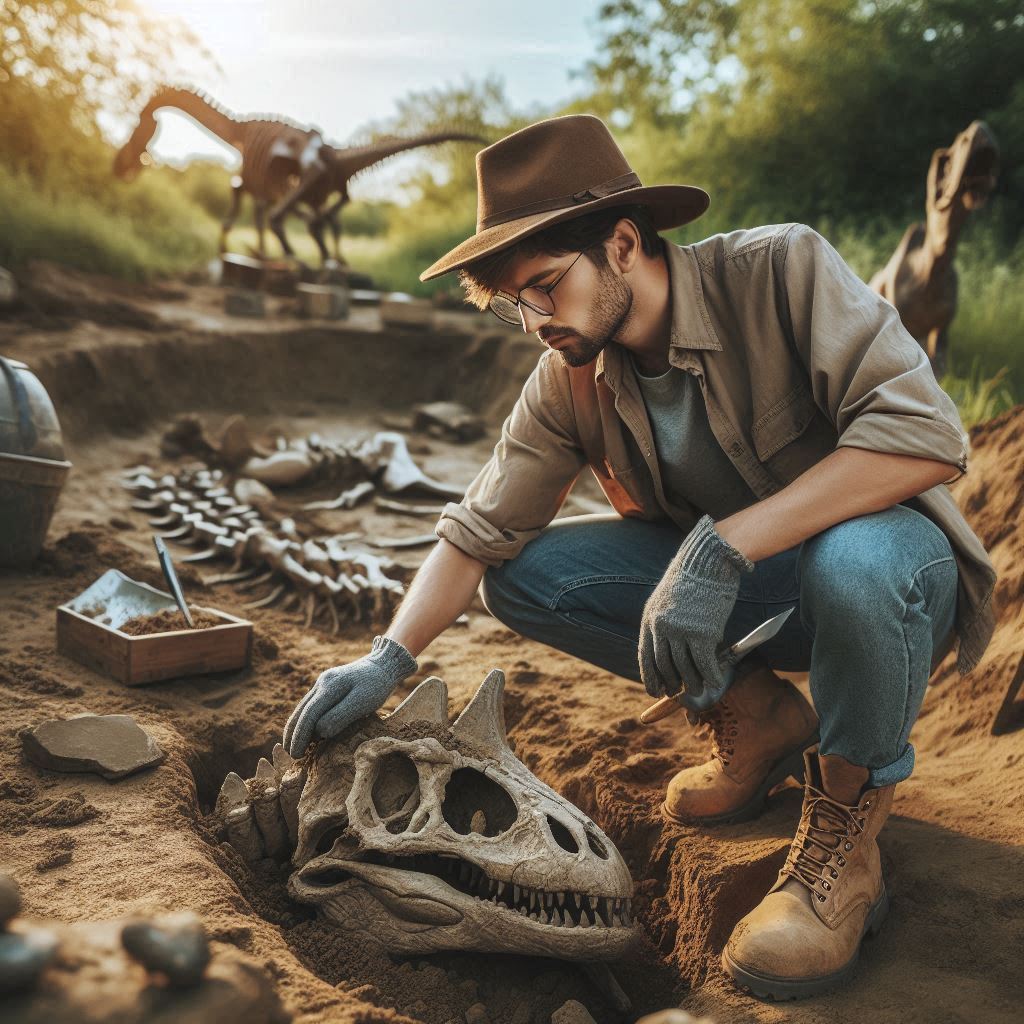Introduction
Paleontology is the study of ancient life through fossils.
This science helps us understand the history of life on Earth.
Paleontologists analyze fossils to learn about past ecosystems and species’ evolution.
They combine geology, biology, and ecology to unravel Earth’s secrets.
Skills play a vital role in achieving success in paleontology.
Strong analytical skills allow paleontologists to interpret data and identify patterns.
Attention to detail ensures accurate observations during fieldwork and lab analysis.
Excellent communication skills help them share findings with colleagues and the public.
Fieldwork is a key component of paleontology.
Physical stamina and problem-solving skills are essential for navigating challenging terrains.
Teamwork is crucial, as paleontologists often collaborate with other scientists and researchers.
Familiarity with modern technology, such as GIS and 3D modeling, enhances their research capabilities.
Strong organizational skills help manage research projects and fieldwork logistics.
Adaptability is essential, as paleontologists often face unexpected challenges in the field.
Continuous learning and a passion for discovery drive successful paleontologists to stay updated with advancements in their field.
Mastering these skills can significantly enhance your career in paleontology, leading to groundbreaking discoveries and a deeper understanding of our planet’s history.
Strong Background in Earth Sciences
Understanding of Geology, Biology, and Ecology
A successful career in paleontology demands a solid foundation in multiple scientific disciplines.
Paleontologists must understand geology, biology, and ecology.
Each of these areas provides essential knowledge for studying ancient life.
Geology in Paleontology
Geology forms the backbone of paleontological studies.
Understanding the Earth’s structure and processes helps paleontologists identify fossil locations.
Geologists study rock formations to determine their age and history.
This knowledge guides researchers in selecting excavation sites.
Moreover, paleontologists analyze sedimentary rocks where fossils often reside.
They examine the conditions that led to fossil formation.
Understanding sedimentation processes aids in reconstructing ancient environments.
A strong grasp of geological principles is crucial for accurate interpretations.
The Role of Biology
Biology is equally important in paleontology.
Paleontologists must understand living organisms and their evolutionary history.
Knowledge of anatomy and physiology helps in reconstructing extinct species.
By studying modern relatives, paleontologists gain insights into ancient organisms.
Additionally, understanding evolutionary theory is vital.
Paleontologists use this knowledge to interpret fossil evidence.
They analyze adaptations and behaviors that evolved over time.
This biological perspective enriches their understanding of the fossil record.
Ecology and Its Importance
Ecology plays a significant role in paleontological studies.
Paleontologists must understand how ancient organisms interacted with their environments.
Knowledge of ecosystems helps in reconstructing past habitats.
They analyze how climate, geography, and biotic factors influenced life.
By studying ancient ecosystems, paleontologists can draw conclusions about biodiversity.
They can track changes in species over time.
Understanding these dynamics informs their research on extinction events and evolution.
Knowledge of Rock Formations and Fossil Preservation
A deep understanding of rock formations is critical for paleontologists.
They study various types of rocks to locate fossils.
Knowledge of sedimentary, igneous, and metamorphic rocks helps in this pursuit.
Each rock type has distinct characteristics that influence fossil preservation.
Identifying Rock Formations
Paleontologists must identify rock layers and their characteristics.
Each layer reveals information about Earth’s history.
This stratigraphic knowledge allows researchers to date fossils accurately.
By understanding the geological timeline, paleontologists place fossils within a historical context.
Additionally, knowledge of structural geology helps paleontologists understand how rock formations changed over time.
This understanding aids in interpreting fossil locations and preservation conditions.
Fossil Preservation Techniques
Fossil preservation is another crucial aspect of paleontology.
Researchers must understand how fossils form and are preserved.
They study processes like mineralization and carbonization.
These processes help transform organic remains into fossils.
Paleontologists also explore how environmental conditions affect preservation.
Factors such as temperature, pressure, and chemical composition play significant roles.
Understanding these influences allows paleontologists to make informed decisions during excavations.
A successful paleontology career requires a comprehensive understanding of geology, biology, and ecology.
Knowledge of rock formations and fossil preservation techniques further enhances research capabilities.
Aspiring paleontologists should prioritize these skills to excel in their careers.
Attention to Detail
Ability to Carefully Examine Fossils for Identification and Research
The ability to examine fossils meticulously is crucial for a successful career in paleontology.
Paleontologists spend hours analyzing fossil specimens.
They identify key features that help determine the species and age.
This skill requires patience, attention to detail, and a strong background in anatomy and biology.
Paleontologists often use tools like magnifying glasses and microscopes during examinations.
They must recognize subtle differences in texture, color, and structure.
These differences can provide vital information about the organism‘s life and environment.
A keen eye can uncover insights that lead to significant scientific discoveries.
Fieldwork plays an essential role in fossil examination.
Paleontologists collect samples in various locations, from deserts to riverbeds.
Each environment presents unique challenges, requiring adaptability and observational skills.
They must also collaborate with geologists and other scientists to ensure accurate identification.
Research is equally important in paleontology.
Paleontologists analyze their findings, comparing them with existing data.
They often publish their results in scientific journals, contributing to the broader scientific community.
This requires strong writing and communication skills to convey complex ideas clearly.
The ability to examine fossils carefully is foundational for paleontologists.
This skill not only aids in identification but also enhances research quality.
A commitment to continuous learning and observation helps paleontologists thrive in their careers.
Precision in Documenting Findings and Data Analysis
Precision in documenting findings is another essential skill for paleontologists.
Accurate records ensure that research can be replicated and verified.
Every detail, from the location of a fossil to its physical characteristics, must be noted meticulously.
This documentation supports future studies and adds credibility to the research.
Paleontologists often use digital tools for data management.
Software programs help organize and analyze fossil records efficiently.
They must learn how to use these tools effectively to maintain data integrity.
This precision extends to data analysis, where attention to detail can uncover trends and patterns.
Data analysis involves comparing new findings with existing databases.
Paleontologists look for correlations that could lead to new theories or discoveries.
Strong analytical skills enable them to interpret complex data sets and draw meaningful conclusions.
Collaboration is vital in this process.
Paleontologists often work in teams, sharing insights and data.
Effective communication ensures that all team members are on the same page.
This collaboration can lead to innovative approaches and enhanced research quality.
In addition, paleontologists must stay updated on technological advancements.
New analytical methods, such as isotopic analysis or computer modeling, can significantly impact their work.
Adapting to these changes requires a willingness to learn and grow professionally.
Precision in documenting findings and data analysis is vital for paleontologists.
These skills ensure that research is credible and valuable.
As paleontology continues to evolve, professionals must remain adaptable and committed to accuracy in their work.
This dedication will ultimately lead to greater success and impactful contributions to the field.
Read: US Chemistry Conferences and Symposiums to Attend in 2024
Critical Thinking and Problem-Solving Skills
Analyzing Complex Geological and Biological Data
Paleontologists work with vast amounts of geological and biological data.
This data often includes fossil records, sediment samples, and stratigraphic information.
Analyzing these complex datasets is crucial for understanding the history of life on Earth.
To analyze geological data, paleontologists often use various tools and software.
They apply statistical methods to interpret their findings accurately.
Familiarity with software programs, such as GIS (Geographic Information Systems), can enhance your data analysis capabilities.
Understanding geological principles also plays a significant role in data analysis.
You need to grasp sedimentology, stratigraphy, and paleoenvironments.
This knowledge helps you identify patterns in the fossil record and understand the conditions in which organisms lived.
Biological data analysis is equally important in paleontology.
Paleontologists study fossilized remains to determine species, behaviors, and evolutionary trends.
You will need to analyze morphological features and compare them with existing species.
This comparative analysis helps you identify evolutionary relationships among ancient organisms.
Critical thinking skills are vital when analyzing data.
You must evaluate data from multiple sources and consider various interpretations.
This ability allows you to develop a comprehensive understanding of ancient ecosystems and their dynamics.
Formulating Hypotheses and Theories Based on Evidence
Formulating hypotheses and theories is another essential skill in paleontology.
Once you gather and analyze data, you need to draw meaningful conclusions.
This process often involves generating hypotheses based on your findings.
A hypothesis is a testable statement that explains your observations.
In paleontology, you might hypothesize about the causes of mass extinctions or changes in climate.
Developing strong hypotheses requires creativity and scientific reasoning.
You must think critically about the evidence and how it connects to your ideas.
Testing your hypotheses is crucial for scientific progress.
You will often collect additional data to support or refute your hypotheses.
This iterative process is fundamental in advancing our understanding of paleobiology.
Collaboration with other scientists is also valuable when formulating theories.
Discussing your findings with colleagues can provide fresh perspectives.
Collaborative research can lead to more robust hypotheses and new insights into ancient life.
Effective communication skills are essential when presenting your theories.
You must convey complex ideas clearly to your audience.
Whether through academic papers or presentations, clear communication fosters collaboration and understanding.
Analyzing complex geological and biological data and formulating hypotheses are crucial skills for paleontologists.
These abilities help you uncover the mysteries of ancient life and contribute to the scientific community.
By developing these skills, you prepare yourself for a successful career in paleontology.
Embrace the challenge, and enjoy the journey into the past!
Read: The Role of Chemists in US Environmental and Sustainability Efforts
Communication Skills
Writing Research Papers and Reports
Effective writing is crucial for a successful paleontology career.
Paleontologists must communicate their research findings clearly and concisely.
Research papers and reports share vital information with the scientific community.
Writing skills enable you to articulate complex ideas in an understandable way.
When writing a research paper, follow a structured format.
Start with an abstract summarizing your findings and objectives.
Next, provide a comprehensive introduction that outlines your research questions.
Describe your methodology in detail, ensuring others can replicate your work.
Present your results using clear tables, graphs, and illustrations.
Visual aids enhance understanding and help convey your findings effectively.
Finally, conclude your paper with a discussion that contextualizes your research within the broader field.
Highlight any implications and suggest future research directions.
Practicing your writing skills regularly is essential.
Join writing workshops or attend courses focusing on scientific writing.
Reading peer-reviewed articles also helps you learn the conventions of scientific communication.
Regular feedback from peers can improve your writing style and clarity.
Presenting Findings at Conferences or to the Public
In addition to writing, presenting findings is a vital skill for paleontologists.
Conferences provide opportunities to share your research with experts in the field.
Effective presentations enhance your visibility and credibility as a researcher.
To prepare for a presentation, organize your content logically.
Begin with a strong introduction that captures the audience‘s attention.
Clearly state your research question and objectives.
Use visuals, such as slides or posters, to support your presentation.
Ensure that your graphics are clear and relevant.
Practice your presentation multiple times to build confidence.
Rehearse in front of peers to receive constructive feedback.
Pay attention to your body language and vocal delivery.
Engaging presentations help maintain the audience‘s interest.
When presenting to the public, simplify complex concepts.
Use everyday language to explain your research findings.
Encourage questions and foster a discussion to enhance understanding.
Engaging with the public can inspire interest in paleontology and scientific research.
Collaborating with Other Scientists and Researchers
Collaboration is essential in the field of paleontology.
Working with other scientists broadens your research perspective and enhances your findings.
Different expertise can lead to more comprehensive studies and innovative solutions.
To collaborate effectively, develop strong interpersonal skills.
Communication is key to successful teamwork.
Clearly express your ideas and actively listen to others‘ perspectives.
Respect diverse viewpoints and be open to new ideas.
Participate in collaborative projects, such as fieldwork or laboratory studies.
These experiences foster teamwork and build valuable professional relationships.
Networking with other researchers at conferences can also lead to future collaboration.
Publishing joint research papers demonstrates your ability to work collaboratively.
It highlights your commitment to advancing the field of paleontology.
Additionally, collaborating can lead to new funding opportunities for joint projects.
In short, writing research papers, presenting findings, and collaborating with other scientists are critical skills for success in paleontology.
Mastering these abilities will enhance your career prospects and contribute to meaningful scientific advancements.
Read: Day in the Life: An Environmental Scientist‘s Typical Day

Technical Skills
Proficiency in Computer Software for Data Analysis
Proficiency in computer software for data analysis is vital for a successful paleontology career.
Modern paleontology relies heavily on data interpretation and analysis.
Paleontologists must be skilled in software such as R, Python, and MATLAB.
These tools help researchers analyze large datasets and draw meaningful conclusions.
Data visualization is another critical aspect of data analysis.
Using software like Tableau or Excel, paleontologists can create visual representations of their findings.
Clear visualizations help communicate complex data to various audiences.
This skill enhances collaboration with other scientists and stakeholders.
Additionally, knowledge of Geographic Information Systems (GIS) is essential.
GIS software allows paleontologists to analyze spatial data related to fossil locations.
Understanding geological distributions can reveal patterns in past ecosystems and species distributions.
This knowledge aids in reconstructing ancient environments and understanding evolutionary trends.
Moreover, machine learning is becoming increasingly relevant in paleontology.
Learning how to implement machine learning algorithms can help you uncover hidden patterns in data.
These advanced techniques can streamline fossil identification processes and enhance predictive modeling.
Keeping up with technological advancements can set you apart from other candidates in the field.
Experience with Mapping Tools and Digitizing Fossil Images
Experience with mapping tools is another crucial skill for aspiring paleontologists.
Mapping tools help in visualizing geological formations and fossil locations.
These tools often integrate with GIS software, offering powerful insights into paleoenvironments.
By utilizing tools like ArcGIS or QGIS, you can create detailed maps of excavation sites.
Mapping allows you to visualize the spatial relationships between fossils and their surrounding environments.
This information is critical for understanding the context of fossil finds.
Digitizing fossil images is equally important in modern paleontology.
High-quality digital images of fossils facilitate accurate analysis and documentation.
Using software like Adobe Photoshop or ImageJ, you can enhance and analyze fossil images effectively.
Moreover, many research projects require creating 3D models of fossils.
Skills in 3D modeling software, such as Blender or MeshLab, can set you apart.
These models allow for detailed examination and can be shared easily among researchers.
Digital imaging also plays a key role in educational outreach.
Paleontologists often share their findings with the public through various platforms.
High-quality images can capture the interest of non-specialists and enhance public understanding.
By mastering digital imaging techniques, you can contribute to broader educational efforts.
Combining mapping and digital imaging skills enhances your overall effectiveness as a paleontologist.
These skills allow for better data collection, analysis, and presentation.
As paleontology continues to evolve, embracing technology is essential for success.
Investing time in learning these skills will pay off in your paleontology career.
They will improve your research capabilities and make you a more attractive candidate for employers.
By honing your proficiency in data analysis and mapping tools, you prepare yourself for a fulfilling career in this exciting field.
Transform Your Career Today
Unlock a personalized career strategy that drives real results. Get tailored advice and a roadmap designed just for you.
Start NowRead: The Impact of Technology on the Chemist Profession in the US
Fieldwork Experience
Ability to Work in Remote Locations and Adverse Conditions
A successful paleontologist must thrive in challenging environments.
Fieldwork often takes place in remote locations far from urban amenities.
Paleontologists must be prepared for long days in harsh weather conditions.
This can include extreme heat, cold, rain, or wind.
Staying focused and motivated under such conditions is crucial.
You may need to hike or travel long distances to reach excavation sites.
Carrying equipment and supplies can be physically demanding.
Thus, strong physical stamina and resilience are essential.
Additionally, working in remote areas often requires self-sufficiency.
You might face limited access to basic necessities, including food and water.
Preparing adequately for these conditions is critical for safety and efficiency.
Learn how to set up camp, manage resources, and navigate rough terrains.
It‘s also important to understand local wildlife and how to interact safely with it.
Awareness of environmental regulations and conservation efforts is vital in these settings.
Collaboration with team members becomes essential in challenging conditions.
Strong communication skills help maintain safety and productivity during fieldwork.
Supporting one another and sharing responsibilities enhances the team’s overall effectiveness.
Developing problem-solving skills will enable you to tackle unexpected challenges.
Flexibility and adaptability are key traits for success in this career.
Knowledge of Excavation and Fossil Collection Techniques
Expertise in excavation and fossil collection techniques is fundamental for paleontologists.
Understanding how to excavate fossils without damaging them is critical.
Proper techniques ensure that you retrieve fossils safely and effectively.
This includes using tools like brushes, picks, and shovels carefully.
Learning to recognize different fossil types also enhances your excavation skills.
You should also be familiar with geological formations and stratigraphy.
This knowledge helps you determine where to excavate and what to expect.
Familiarity with sediment types can indicate where fossils are likely to be found.
Additionally, understanding the rock layers can provide context about the fossil’s age and environment.
Paleontologists must document their findings meticulously.
Accurate record-keeping includes noting the location, depth, and context of each fossil.
This information is essential for future research and understanding the fossil‘s significance.
Photographing excavation sites and fossils can aid in documentation.
You should also develop skills in preparing fossils for analysis and study.
This often involves cleaning, consolidating, and repairing fossil specimens.
Working with a variety of materials is common in this field.
You might handle fragile fossils, requiring special care and attention.
Knowing how to preserve and store fossils properly is critical for long-term study.
Understanding conservation techniques can prevent damage to irreplaceable specimens.
Staying current with advancements in excavation technology is also beneficial.
New tools and techniques can improve the efficiency and effectiveness of fossil collection.
Attending workshops, conferences, and training sessions can enhance your skills.
Building a strong foundation in excavation and fossil collection techniques prepares you for success in paleontology.
The ability to work in remote conditions and knowledge of excavation techniques are vital for aspiring paleontologists.
Gain More Insights: Advancements in Forensic Science Technology
See Related Content: Balancing Work and Life as a Professional Astronomer
Curiosity and Passion for Discovery
A Drive to Unravel the Mysteries of Prehistoric Life
A successful paleontology career starts with a deep passion for prehistoric life.
This drive fuels curiosity about ancient organisms and their environments.
Paleontologists must possess a strong desire to understand how these organisms lived and evolved.
This passion often leads to exciting discoveries that change our understanding of the Earth’s history.
Curiosity is the backbone of paleontology.
Paleontologists continuously question existing knowledge and explore new theories.
They investigate fossils, geological formations, and ancient climates to uncover insights.
A strong desire to seek answers pushes paleontologists to dig deeper into their research.
This relentless pursuit of knowledge often yields valuable findings.
Critical thinking plays a vital role in unraveling these mysteries.
Paleontologists analyze complex data and draw conclusions from limited evidence.
They often work with incomplete fossil records and must piece together information to form a coherent picture.
Strong analytical skills allow them to interpret findings effectively and connect different aspects of ancient life.
Observation is another crucial skill for paleontologists.
Careful examination of fossils reveals essential information about ancient organisms.
Paleontologists must identify unique features, such as bone structure and texture, to make accurate classifications.
Keen observational skills help them notice details that others might overlook.
These details can lead to groundbreaking insights about evolutionary processes.
Constantly Seeking to Expand Knowledge and Skills in the Field
The field of paleontology is ever-evolving.
Therefore, paleontologists must stay updated on the latest research and techniques.
A commitment to continuous learning is essential for career advancement.
Attending conferences and workshops keeps them informed about new discoveries and methodologies.
Reading scientific journals is another way paleontologists expand their knowledge.
Staying current with recent studies allows them to build on existing research.
By understanding current trends, paleontologists can refine their own work.
This knowledge empowers them to make informed decisions in their research.
Networking with other professionals is equally important.
Collaborating with fellow researchers opens new avenues for discovery.
Sharing ideas and experiences helps paleontologists broaden their perspectives.
This exchange of information fosters a supportive community, allowing everyone to grow together.
Fieldwork experience is vital for developing practical skills.
Paleontologists gain hands-on experience by participating in excavations and fossil analysis.
They learn to use specialized tools and techniques essential for their work.
This practical knowledge enhances their understanding of theoretical concepts.
Embracing technology is increasingly important in paleontology.
Skills in data analysis, geographic information systems (GIS), and 3D modeling are becoming more valuable.
Familiarity with these tools enables paleontologists to analyze data more effectively.
It also allows them to communicate their findings to a broader audience.
A successful career in paleontology requires a combination of passion, critical thinking, and continuous learning.
A drive to uncover the mysteries of prehistoric life fuels this journey.
Meanwhile, the commitment to expanding knowledge and skills ensures paleontologists remain at the forefront of their field.
This combination of skills and dedication leads to exciting discoveries and a fulfilling career.
Adaptability and Resilience
Ability to Handle Setbacks and Challenges in Research
A successful career in paleontology often involves navigating setbacks and challenges.
Research in this field can be unpredictable and complex.
You might encounter unexpected results, funding issues, or logistical challenges during fieldwork.
Developing resilience becomes crucial for overcoming these hurdles.
When faced with setbacks, a paleontologist must remain adaptable and resourceful.
Maintaining a positive attitude helps you push through difficult situations.
Instead of viewing setbacks as failures, you can see them as learning opportunities.
By analyzing what went wrong, you can refine your approach for future projects.
Collaboration plays a vital role in overcoming research challenges.
Working with colleagues allows for shared ideas and solutions.
Engaging with a team fosters a supportive environment.
This support can be invaluable when tackling complicated research problems.
Networking with other professionals also opens doors to new resources and techniques.
Effective time management skills enhance your ability to handle setbacks.
When research doesn‘t go as planned, you must reallocate your time efficiently.
Prioritizing tasks helps you focus on what‘s most critical.
This ability allows you to adapt to changes and maintain productivity despite challenges.
Emotional intelligence is another key skill in managing setbacks.
Understanding your emotions and those of others helps you navigate difficult situations.
Strong interpersonal skills create a collaborative atmosphere, making it easier to address issues.
Building relationships with mentors and peers can provide guidance and encouragement when facing challenges.
Willingness to Learn and Grow from Mistakes
A successful paleontologist embraces a mindset of continuous learning.
Mistakes are inevitable in research, but they offer valuable insights.
The ability to learn from errors sets apart the most successful professionals.
Instead of dwelling on what went wrong, focus on the lessons learned.
After a setback, take time to reflect on your approach.
Analyze what you could have done differently.
This critical self-assessment fosters growth and development.
Implementing changes based on these insights can lead to better outcomes in the future.
Seeking feedback is an essential part of learning.
Colleagues, mentors, and supervisors can provide constructive criticism.
Their insights can highlight areas for improvement and help you refine your skills.
Being open to feedback shows a commitment to personal and professional growth.
Participating in workshops, conferences, and additional training enhances your knowledge base.
Staying updated on the latest research trends and technologies is vital.
This willingness to learn expands your skill set and prepares you for future challenges.
Moreover, sharing your mistakes with others creates a culture of openness.
Discussing challenges and failures fosters a collaborative environment.
This transparency encourages others to learn from their mistakes too.
Building a supportive community strengthens the entire field of paleontology.
In closing, resilience and a commitment to continuous learning are essential skills for a successful paleontology career.
Embrace setbacks as opportunities for growth.
Maintain a positive attitude, seek feedback, and stay open to learning.
By doing so, you will not only enhance your career but also contribute to the advancement of paleontology.
Conclusion
A successful career in paleontology requires a unique blend of skills.
First, strong analytical skills enable paleontologists to interpret complex data and fossils.
They must also possess excellent observation skills, as minute details can reveal vital information about ancient life.
Fieldwork plays a significant role in paleontology.
Thus, physical stamina and endurance are essential for long days of excavation.
Communication skills are equally important.
Paleontologists must present their findings clearly to diverse audiences, including scientists and the public.
A solid foundation in scientific writing is crucial for publishing research.
Proficiency in laboratory techniques also enhances their ability to analyze samples accurately.
Additionally, computer skills, particularly in data analysis software, are increasingly valuable in modern paleontological research.
Aspiring paleontologists should actively seek education and experiences that foster these skills.
Engage in relevant coursework during your studies and pursue internships in museums or research institutions.
Participate in fieldwork opportunities whenever possible to gain practical experience.
Embrace your passion for paleontology and develop these vital skills.
Your dedication to education and experience will set you apart in this fascinating field.
With persistence, you can make significant contributions to our understanding of Earth’s prehistoric past.
[E-Books for Sale]
The Big Book of 500 High-Paying Jobs in America: Unlock Your Earning Potential
$19.99 • 500 High-Paying Jobs • 330 pages
Explore 500 high-paying jobs in America and learn how to boost your career, earn more, and achieve success!
See All 500 High-Paying Jobs of this E-Book
1001 Professions Without a Degree: High-Paying American Jobs You Can Start Now
$19.99 • 1001 Professions Without a Degree • 174 pages
Discover 1001 high-paying jobs without a degree! Unlock career tips, skills, and success strategies for just $19.99!




